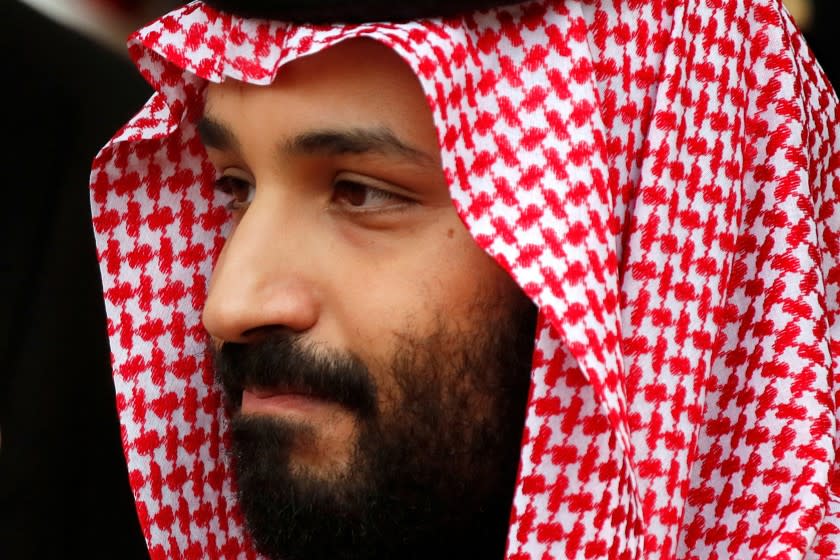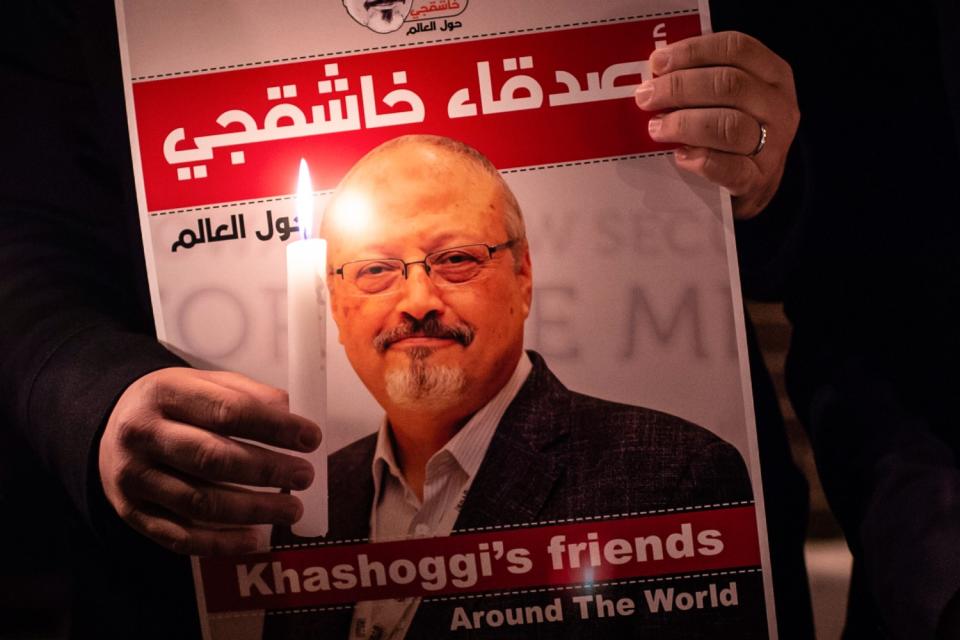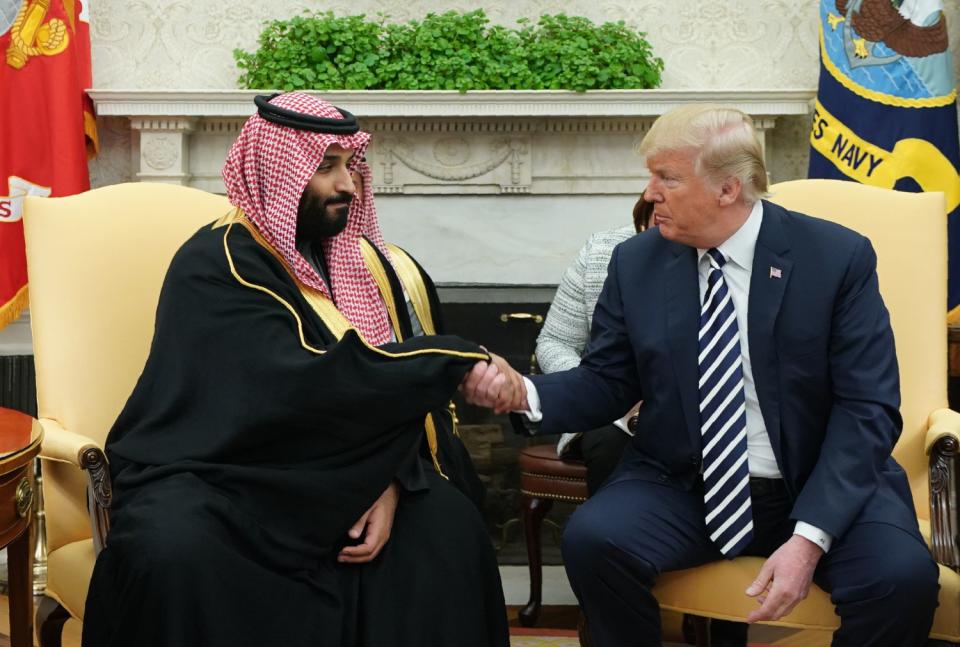'Capture or kill': U.S. report says Saudi crown prince targeted Jamal Khashoggi

- Oops!Something went wrong.Please try again later.
The Biden administration Friday sanctioned Saudi officials, but not the kingdom's crown prince, Mohammed bin Salman, for the killing of journalist Jamal Khashoggi, after releasing an intelligence report concluding he was responsible for the grisly murder.
The restrained response to a crime that caused worldwide outrage suggested the limits to how far President Biden will go to reshape relations with Saudi Arabia, a long-standing ally with a dismal human rights record and conflicting goals in the Middle East.
Khashoggi, a Saudi dissident who was living in the United States and writing for the Washington Post, was murdered more than two years ago in Turkey. The operation to "capture or kill" him was approved by the crown prince, the heir to the Saudi throne and the kingdom's de facto ruler, according to the declassified intelligence assessment, which the Trump administration had withheld.
The report "shines a bright light" on Khashoggi's murder, Secretary of State Antony J. Blinken said, but the administration's response was not intended to break ties with Saudi Arabia.
"The relationship with Saudi Arabia is an important one," Blinken said. "But we also want to make sure, and this is what the president has said from the outset, that the relationship better reflects our interest and our values. And so what we've done by the actions that we've taken is really not to rupture the relationship, but to recalibrate."
In addition to sanctions targeting the financial assets of top Saudi officials, the State Department announced it would implement what it called the "Khashoggi Ban" to limit travel visas for people who threaten or harm journalists and activists on behalf of foreign governments. Seventy-six Saudis were immediately subjected to the new restrictions.
Although U.S. officials did not penalize the crown prince, the decision to declassify and release the report and to sanction his underlings for Khashoggi's murder represented a shift from former President Trump, who publicly cast doubt on the findings of U.S. intelligence agencies and continued to embrace Mohammed.
Biden has distanced himself from the Saudis since taking office just over one month ago. He slashed U.S. support for the Saudi-led war in Yemen, which has caused devastating civilian casualties, and he's attempting to resuscitate the multilateral Iran nuclear agreement, which the Saudis oppose.
Khashoggi was last seen entering the Saudi Consulate in Istanbul on Oct. 2, 2018, to obtain paperwork he needed to remarry. Once inside, he was killed and dismembered with a bone saw; his remains were never recovered.

No one other than the crown prince could have directed the operation, the brief report concluded. He has had "absolute control" of the kingdom's security forces for years, it said, and instilled a level of fear in his subordinates that made them unlikely to "undertake sensitive actions without his consent."
The 15-member team that traveled to Istanbul to target Khashoggi included seven members of Mohammed's "elite personal protective detail," which "exists to defend the crown prince, answers only to him, and had directly participated in earlier dissident suppression operations," the report said.
Mohammed was known for supporting "violent measures to silence dissidents abroad," the report said, but it was not clear when the Saudis chose to kill Khashoggi.
"We do not know how far in advance Saudi officials decided to harm him," the report said. But there was no question that Mohammed "viewed Khashoggi as a threat to the Kingdom and broadly supported using violent measures if necessary to silence him."
The Saudi Ministry of Foreign Affairs said it "completely rejects the negative, false and unacceptable assessment pertaining to the Kingdom's leadership."
Rep. Adam B. Schiff (D-Burbank) said in an interview he was glad "the administration pulled no punches" with the report's release. However, he said the administration should go further to directly punish the crown prince.
"It's discordant, to say the least, to sanction those who were ordered to capture or kill an American resident and journalist but to give a pass to the one who did the ordering," he said.
Fred Ryan, publisher and chief executive of the Washington Post, also suggested more should be done to hold the crown prince "fully accountable."
"More than two years has gone by since Jamal's unthinkable death — it is time the United States and freedom-loving nations around the world ensure there is justice for Jamal," he said in a statement.
For years, Khashoggi was friendly with the Saudi monarchy and often sympathetic to its policies. But after moving to the United States, his writing became increasingly critical as the crown prince was consolidating power and using brutal tactics.
Because of his status as a onetime insider, Khashoggi and his rebukes were less easy to dismiss than attacks from Western critics and human rights organizations, which consider Saudi Arabia one of the world's most repressive regimes.
Furthermore, Khashoggi had a prominent platform as a contributor to the Post's opinion pages, which he used to advocate for democratic reforms. In one of his last columns, Khashoggi wrote that "what the Arab world needs most is free expression.”
Saudi Arabia first falsely claimed that Khashoggi had left the consulate but later admitted that he had been killed. The crown prince vaguely took responsibility for Khashoggi's fate — "it happened under my watch," he told PBS in 2019 — but never acknowledged ordering the operation.
Biden spoke with Saudi King Salman for the first time as president on Thursday. In an interview Friday with Univision, Biden said he "made it clear to him that the rules are changing" and suggested the administration could announce further steps after the weekend.
"We are going to hold them accountable for human rights abuses," he said, and criticized his predecessor for refusing to release the intelligence assessment. "It is outrageous what happened."
Trump fawned over Saudi's royal leaders and ignored the outcry over Khashoggi's murder to push through arms sales to the kingdom, in defiance of Congress. The former president accepted the crown prince's explanation that he had nothing to do with the killing. "Maybe he did and maybe he didn't," Trump said in a statement one month after Khashoggi's death.

Although Trump was especially eager to please the kingdom's leaders, the diplomatic, economic and security ties between the U.S. and Saudi Arabia are deep and stretch back decades. A swift, dramatic change in the relationship is unlikely, said Rajan Menon, a political scientist at the City College of New York and Columbia University who specializes in war, peace and ethics.
“Any fundamental changes in relations that are so long-standing, so entrenched and with deep support from both political parties can’t be made suddenly," Menon said in an interview. “It’s like an oil tanker; you can’t just turn it around.”
Still, he said, both the disastrous war in Yemen and now the Khashoggi report present an “opportunity” to take stock of the relationship.
One of Biden’s first actions in office was to end American participation in offensive military operations in Yemen, where until now the U.S. was assisting Saudi Arabia and the United Arab Emirates in increasingly deadly airstrikes. He has suspended arms sales to both countries pending review.
The U.S. joined the Saudi-led coalition fighting Iran-supported Houthi rebels in Yemen with the stated goals of reining in Tehran and launching counter-terrorism measures against Al Qaeda offshoots active in the Arabian Peninsula. But the campaign unleashed the worst humanitarian crisis on the planet, with widespread death, destruction and hunger, while doing little to diminish Iran’s role and allowing jihadist militias to proliferate.
Ilan Goldenberg, a Middle East expert at the Center for a New American Security and a former State Department official, said that “to some extent” the Biden administration is returning to traditional diplomacy with the kingdom after “four years of green lights for everything” for the Saudis under Trump.
“The view in D.C. is we are not going to walk away from Saudi Arabia, and if Saudi Arabia demonstrates a new seriousness and checks some of these bad habits and problematic behaviors that are against our interests, there will be a relationship,” Goldenberg said. “If it doesn’t, and it continues on the current track, then the U.S. is really going to step back."
Goldenberg noted that the Saudis, known to have an extensive and sophisticated army of lobbyists in Washington, are plotting how to “stay in the good graces” of the new U.S. government.
This story originally appeared in Los Angeles Times.

